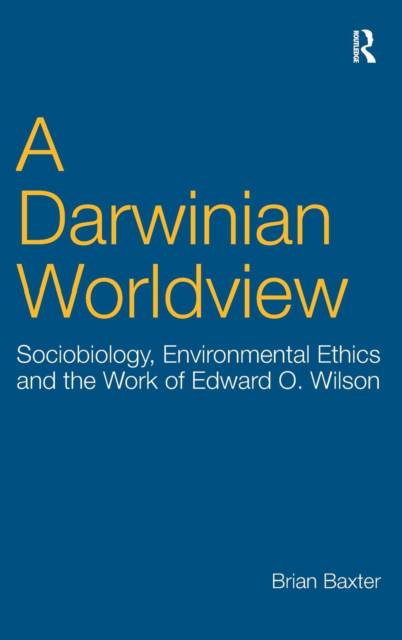
- Afhalen na 1 uur in een winkel met voorraad
- Gratis thuislevering in België vanaf € 30
- Ruim aanbod met 7 miljoen producten
- Afhalen na 1 uur in een winkel met voorraad
- Gratis thuislevering in België vanaf € 30
- Ruim aanbod met 7 miljoen producten
Zoeken
A Darwinian Worldview
Sociobiology, Environmental Ethics and the Work of Edward O. Wilson
Brian Baxter
Hardcover | Engels
€ 290,45
+ 580 punten
Uitvoering
Omschrijving
Darwin's theory of evolution by natural selection is considered in its application to human beings in this book. Brian Baxter examines the various sociobiological approaches to the explanation of human behaviour which view the human brain, and so the human mind, as the product of evolution, and considers the main arguments for and against this claim. In so doing he defends the approaches against some common criticisms, such as the charge that they are reductionist and dehumanising. The implications of these arguments for the social sciences and humanities are assessed, as is the naturalistic view of ethics to which they lead. A key issue examined in the book is the connection between this Darwinist perspective on human beings and modern environmental ethics, which also often assume that human beings are part of an evolved living world. The implications of these positions for the meaningfulness of human life are also examined. Throughout the discussion the positions in sociobiology and environmental ethics developed by Edward O. Wilson are taken as an exemplar of the characteristic features of a Darwinian worldview, and the arguments of Wilson and his chief critics are thoroughly examined.
Specificaties
Betrokkenen
- Auteur(s):
- Uitgeverij:
Inhoud
- Aantal bladzijden:
- 208
- Taal:
- Engels
Eigenschappen
- Productcode (EAN):
- 9780754656784
- Verschijningsdatum:
- 28/07/2007
- Uitvoering:
- Hardcover
- Formaat:
- Genaaid
- Afmetingen:
- 156 mm x 234 mm
- Gewicht:
- 471 g

Alleen bij Standaard Boekhandel
+ 580 punten op je klantenkaart van Standaard Boekhandel
Beoordelingen
We publiceren alleen reviews die voldoen aan de voorwaarden voor reviews. Bekijk onze voorwaarden voor reviews.











